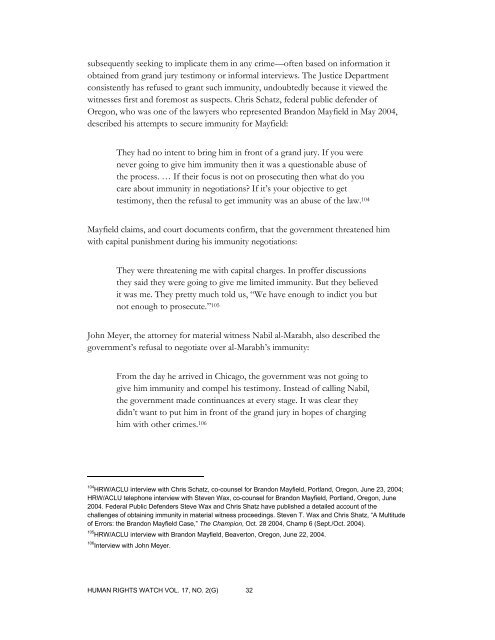Witness to Abuse - Human Rights Watch
Witness to Abuse - Human Rights Watch
Witness to Abuse - Human Rights Watch
Create successful ePaper yourself
Turn your PDF publications into a flip-book with our unique Google optimized e-Paper software.
subsequently seeking <strong>to</strong> implicate them in any crime—often based on information it<br />
obtained from grand jury testimony or informal interviews. The Justice Department<br />
consistently has refused <strong>to</strong> grant such immunity, undoubtedly because it viewed the<br />
witnesses first and foremost as suspects. Chris Schatz, federal public defender of<br />
Oregon, who was one of the lawyers who represented Brandon Mayfield in May 2004,<br />
described his attempts <strong>to</strong> secure immunity for Mayfield:<br />
They had no intent <strong>to</strong> bring him in front of a grand jury. If you were<br />
never going <strong>to</strong> give him immunity then it was a questionable abuse of<br />
the process. … If their focus is not on prosecuting then what do you<br />
care about immunity in negotiations? If it’s your objective <strong>to</strong> get<br />
testimony, then the refusal <strong>to</strong> get immunity was an abuse of the law. 104<br />
Mayfield claims, and court documents confirm, that the government threatened him<br />
with capital punishment during his immunity negotiations:<br />
They were threatening me with capital charges. In proffer discussions<br />
they said they were going <strong>to</strong> give me limited immunity. But they believed<br />
it was me. They pretty much <strong>to</strong>ld us, “We have enough <strong>to</strong> indict you but<br />
not enough <strong>to</strong> prosecute.” 105<br />
John Meyer, the at<strong>to</strong>rney for material witness Nabil al-Marabh, also described the<br />
government’s refusal <strong>to</strong> negotiate over al-Marabh’s immunity:<br />
From the day he arrived in Chicago, the government was not going <strong>to</strong><br />
give him immunity and compel his testimony. Instead of calling Nabil,<br />
the government made continuances at every stage. It was clear they<br />
didn’t want <strong>to</strong> put him in front of the grand jury in hopes of charging<br />
him with other crimes. 106<br />
104<br />
HRW/ACLU interview with Chris Schatz, co-counsel for Brandon Mayfield, Portland, Oregon, June 23, 2004;<br />
HRW/ACLU telephone interview with Steven Wax, co-counsel for Brandon Mayfield, Portland, Oregon, June<br />
2004. Federal Public Defenders Steve Wax and Chris Shatz have published a detailed account of the<br />
challenges of obtaining immunity in material witness proceedings. Steven T. Wax and Chris Shatz, “A Multitude<br />
of Errors: the Brandon Mayfield Case,” The Champion, Oct. 28 2004, Champ 6 (Sept./Oct. 2004).<br />
105<br />
HRW/ACLU interview with Brandon Mayfield, Beaver<strong>to</strong>n, Oregon, June 22, 2004.<br />
106<br />
Interview with John Meyer.<br />
HUMAN RIGHTS WATCH VOL. 17, NO. 2(G) 32
















